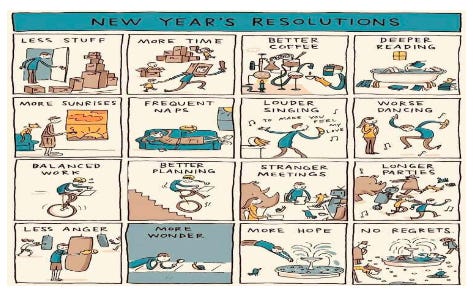In a classic TED talk, Malcolm Gladwell tells the story of Howard Moskowitz and how he radically changed the food industry and our perception of choice. ‘There is no perfect pickle’, Gladwell says, smiling in anticipation of the punchline. ‘There are only perfect pickles.’
In a society where happiness is measured by what we own, we usually find ourselves vying to purchase the most expensive this or the most authentic that. Gladwell’s talk (& Moskovitz’s work) serve as a reminder that choice & happiness are personal. Only by embracing what truly speaks to us (extra chunky tomato sauce?) can we arrive at a more complete & lasting happiness.
Ok how does this connect with New Year resolution(s)?
The only thing harder than keeping New Year resolutions is trying to remember them…soon after making them. Ouch.
62% of people report feeling pressured to set New Year resolution(s).
The most common resolutions include losing weight, exercising more, eating healthier, saving money, and learning a new skill.
And yet, 40% abandon their resolutions within the first week.
80% have ditched their resolutions by mid-February.
What’s going on?
Well, Gladwell provides one answer — we pick ‘universal’ goals rather than meaningful, personal goals — because resolutions are a kind of performative socializing.
In addition, 50% of people make resolutions in the 7 days between Christmas and New Year. 20% people make them in January (the procrastinators). Most people wait until the very last minute to set resolutions, which doesn't give them much time to plan or prepare. Gyms and other subscription services make a killing at this time of the year, year after year.
Resolutions – made right – can make a huge difference in boosting happiness.
Gretchen Rubin studies happiness, good habits, and human nature - she identifies Four Tendencies — a framework that divides the world into Upholders, Questioners, Obligers, and Rebels. (Want to know your Tendency? Take this free, quick quiz here.)
I have benefited from James Clear’s work on building new habits1. My ‘tendency’ as an Upholder makes it relatively easy to make and keep resolutions. Perhaps Upholders are the biggest cohort in the 20% people who report following through on their resolutions and meeting their goals.
My friend Sam is an Obliger: ‘I don’t make New Year’s resolutions because I never manage to keep them—I never make time for myself.’ Folks like her are discouraged because they’ve tried and failed in the past.
Rubin’s solution for Obligers: Create outer accountability. Resolving to read more? Join a book club. Resolving to exercise? Join a class, work out with your spouse or a trainer, there are many ways to build outer accountability. And that’s what obligers like Sam need. It’s not a matter of motivation, setting priorities, putting themselves first; she must have outer accountability to meet inner expectations.
Questioners are good at keeping resolutions that they set for themselves, but usually start them whenever the time seems right. (vs the artificial ‘New Year’ timing)
Questioners struggle when they’re not convinced that the resolution is the best way for them to meet their aim. To do a better job of keeping a resolution, they must do their research, get clarity on why they’re pursuing a certain aim in a certain way, and reassure themselves that the chosen approach makes sense.
Rebels don’t bind themselves in advance, so New Year resolutions do not appeal to them. They want to do what they want, in their own way, in their own time.
On the other hand, some Rebels love the challenge of a New Year’s resolution: ‘My family thinks I can’t give up sugar for a year? Well, watch me!’
People often ask me, “Is it a good idea to make New Year’s resolutions?”
The fact is, there’s no one-size-fits-all solution for happiness and good habits. If making a New Year’s resolution appeals to you, try it. If you dislike the idea, don’t. There’s no special magic to it. I think it’s great to have milestones that remind us to consider our lives and how we could be happier. It’s whatever works for you.
If you want to keep a resolution — for the New Year, or at any other time—knowing your Tendency can help you stick to it. This knowledge provides important clues for how to address challenges that come up.
If you’re an Obliger, spending a lot of time focusing on motivation won’t help. If you’re a Rebel, signing up for a class probably won’t work. If you’re a Questioner, you’re not going to follow someone else’s program without questions.
Rubin’s approach is consistent with Moskovitz’s findings — choice and happiness are personal.
The perfect picke has much in common with succesful resolutions — they must be just right for you.
One final (second) thought on Christmas gifts:
If you’ve a wishlist, the good news is that Santa’s generosity is not contingent upon completing past year resolutions. Good behaviour counts, though (and I have made it easy for you to get brownie points when you use one or more reaction buttons in this post 😀).
Season’s Greetings & Best Wishes for 2024!




